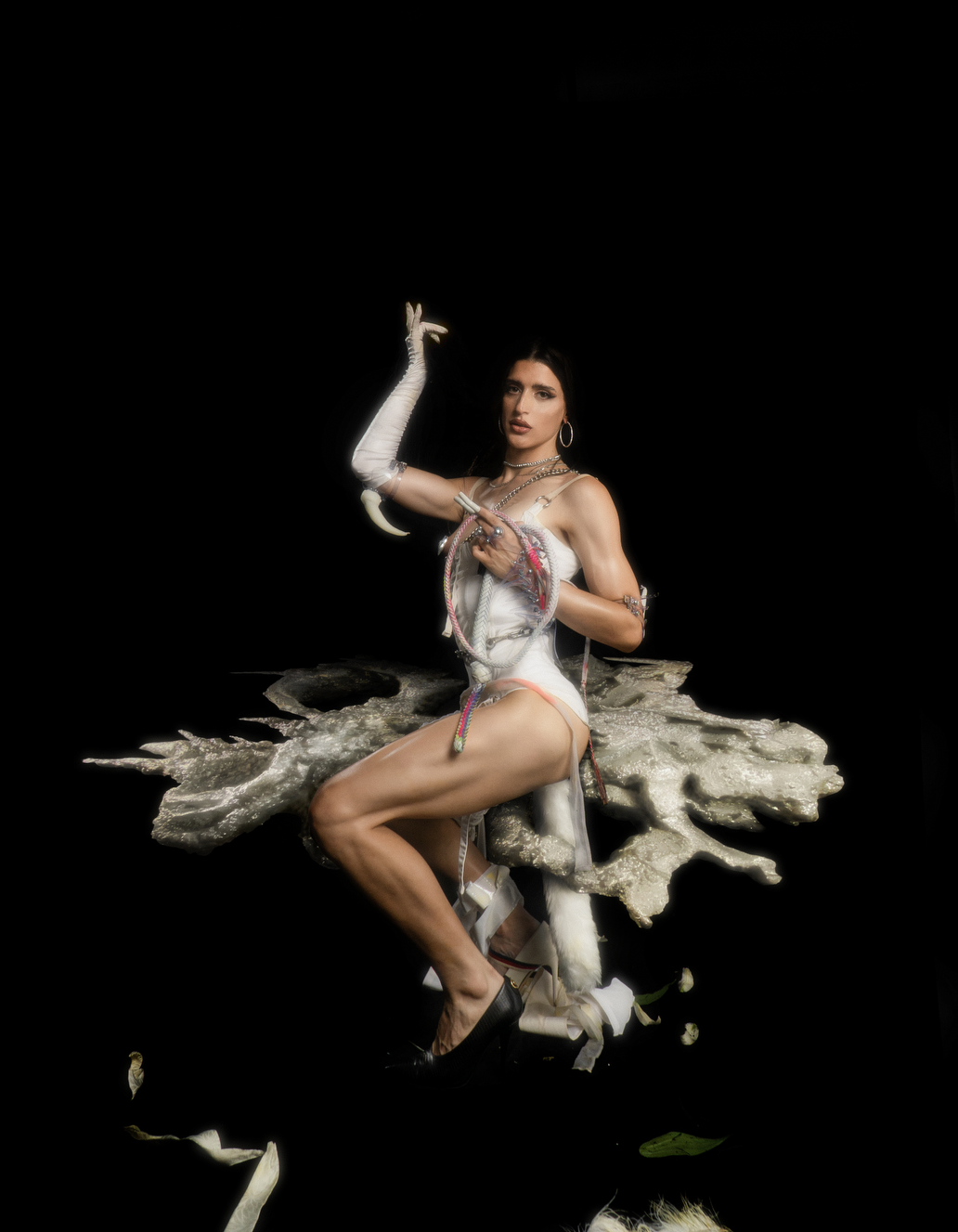While Alejandro Ghersi already had amassed production credits ranging from FKA twigs and Kelela to Kanye by the time he turned 25, it was his work on Björk’s emotionally laden Vulnicura that served as Arca’s coming-out moment. During a rapturous and heart weary set by Ms. Guðmundsdóttir at Carnegie Hall back in 2015, said coming out was sartorial, Ghersi changing from a tough black leather jacket outfit to a plunging little black number over the course of the night, showing that even as an accompanist, Arca himself was an artist in constant flux, toggling between the masculine and feminine, refined beauty and spurts of noise.
Ghersi’s own work has reveled in gnarled electronic noise, a sound informed by both gender fluidity and John Carpenter’s The Thing, the grotesque overshadowing its gorgeous moments, body horror trumping body love. Jesse Kanda’s cover visuals of flesh matched the music within: bulbed, blackened, ghoulish and distorted. But for Arca’s self-titled third album (and first for XL), Ghersi’s own visage is front and center, and the first sound audible is his own voice. It’s his first time trusting that instrument; on “Piel,” it’s a castrato that quivers in the silence, soon in duet with lancing white noise and foreboding bass. His voice traces a melodic contour not unlike “Somewhere Over the Rainbow” as rendered at Mulholland Drive’s Club Silencio, singing of sloughing off old skin.
Peeling back the density and obtuseness of Xen and Mutant, Arca is his most engaging, emotionally draining and confrontational album to date. Arca’s hallucinatory production chops have never been in question, but in nudging towards actual songs as they do here, they find their most effective juxtapose, by turns seductive and fraught with every breath. In Arca’s wedding of voice and electronics, Ghersi most closely resembles Björk, who encouraged him to sing on his own music. Even without that knowledge, the catch in his throat on “Coraje” echoes hers on Vespertine’s “Cocoon” and on the spare “Anoche,” he renders the sentiment of “I Miss You” en espagñol, cooing for a love he misses, though hasn’t met him yet.
When he reaches into his high register, he also evokes ANOHNI, another icon who deploys abstract electronics to convey world-weary anguish with a sigh. But the contorted figures he conjures around his voice are pure Arca, more austere and striking than his previous work. He basks in negative space, his voice often at a whisper or a breath as if right in your ear, so that his razors sink in even deeper. “Reverie” arrives in a thrum of synthesized strings both queasy and dramatic, their timbres veering from the crystalline to the sticky as the song ratchets up in intensity, thwacked beats jai alai-ing around the stereo field. He sounds seductive in one breath, demented in another distorted exhalation.
Ruminative, distraught, sorrowful, heartbroken, Arca uses his voice to crawl inside such frayed emotional states. “Sin Rumbo” sings of a lost love and the unbridgeable distance between people, Ghersi’s croon close by, with the eerie ambience, distorted strings and flickers of bass sounding as if from deep down a chasm. Brief instrumental interludes showcase his mastery of electronic music’s past: “Whip” reconfiguring Autechre’s peerless sound design as kink, while “Castration” features those frigid “Eski” synths of early grime, which Arca then flings about like a pouting Ice Queen.
Previously this was Arca’s province, abstract and mangled textures made into a shape-shifting din, but now he no longer sounds content to just move amid these twisted forms. Now, the drama and the emotional catharsis comes from his throat and Arca continues to sing of the melancholy, disillusioned, and altogether dark emotions that shadow love. He delivers “Fugaces” in a sensuous croon, electronics shimmering like night stars around it; a pulse like a dying heartbeat courses through the hushed mood of “Miel.”
For all of the attention that Arca’s thrilling productions garnered in their audacious deconstructions of prevailing pop paradigms, it’s delectable to have him cautiously come return to those motifs on the album’s closest thing to a pop moment, “Desafio.” Air raid sirens, which would normally suggest a hands-up dance track, instead seep out in brief snatches. Deep bass slithers rather than drops, his falsetto overlaid until it achieves an airy perfection. It scans as the album’s most triumphant moment, though Ghersi’s words belie that sense. Instead he sings to a potential lover of the abyss inside him, asking that his body be bound, his throat slit. It’s a paean to love as only Arca can render it.





